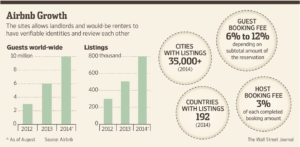Although, the recent November election was an off year with few major items on the ballot, there was one big takeaway from last election that could be precedent setting for cities throughout the country. It is amazing that Airbnb spent over 4.2m on one small local election and got creamed with 70% of residents voting against. What was the November election about? How will this impact other cities?
What was the November election about?
Jersey City, a four-minute train ride from Manhattan, has become crucial territory for Airbnb as a popular and affordable lodging alternative to New York. It’s in close proximity to the Big Apple’s main tourist attractions, but doesn’t fall under New York City’s stringent short-term rental rules that have frustrated Airbnb and its host community for years. There were about 300 Airbnb listings in Jersey City per night in 2015, and that number has shot up to about 3,500, according to Jersey City.
The new rules that were approved in the special election would require owners of short-term rentals to acquire a city permit and set caps on the size and number of units that can be used for such purposes. A property can be rented for a maximum of 60 days a year if the owner isn’t physically on the site. Renters also would be barred from using their units as short-term rentals under the proposed ordinance. Furthermore, it bars any nightly rentals in buildings with four or more units.
This initiative passed with over 70% supporting the restriction of nightly rentals. According to Airbnb 90% of all nightly rentals will be banned within the city. This occurred after Airbnb spent over $4.2 million to defeat the legislation.
Why is this precedent setting?
Regulations are starting to catch up with the new business model of the sharing economy. Cities across the country are now coming to terms with the impacts of nightly rentals as primary residents demand action. Before now nightly rentals have been the wild west of regulation, but the tide is starting to change quickly. Jersey City’s new nightly rental regulations are a template for other cities to begin stricter enforcement as quality of life becomes impacted from the new sharing economy. Cities like Denver and even Atlanta have started to implement regulations severely restricting nightly rentals.
In Denver, felony charges have been filed against multiple hosts that illegally rented their house that was not their primary residence. Even in Atlanta, suburbs like Dunwoody are banning nightly rentals. Jersey City is another example of stricter regulation coming down the pipe for nightly rentals that looks to only accelerate.
November Election Impact on real estate
Nightly rentals are no doubt driving up prices by reducing inventory that could be used for longer term rentals or other homeowners looking to purchase. This decrease in supply is exasperated in already constrained markets like Denver. Why would someone rent monthly when they could get double or triple the revenue by renting nightly? This has led to immense growth in nightly rentals.
Just as fast as nightly rentals have transformed the market, they can go down just as quickly. The majority of nightly rentals are not rented by someone who has a primary residence. Logically if you were renting your primary residence, where would you live? This creates an interesting dynamic since primary residence owners are the ones that can vote in elections.
There is no zoning or regulation that will ensure an owner’s ability to rent their property on a nightly basis. Without this protection, nightly rentals could be toast along with the revenues the owners received as we saw with changes in Denver, Jersey City, Atlanta, Lake Tahoe, Crested Butte, and countless others.
Summary
Jersey City and others are just the tip of the iceberg. Cities are just now grasping regulation of this new industry. Many investors will ultimately get burned by the increased regulation. A nightly rental might look like a great real estate investment on paper, but the potential might be fleeting as increased conflict occurs between residents and investors in many areas. Remember it is residents that get to vote for the new regulations that could ultimately change your fortune so plan accordingly when valuing a property and valuing the income from the nightly rental.
Additional Reading
- https://www.wsj.com/articles/airbnb-spends-millions-to-fight-jersey-city-ballot-measure-curbing-short-term-rentals-11572796802
- https://www.bloomberg.com/news/articles/2019-11-06/airbnb-loses-n-j-home-share-war-by-a-landslide
- https://www.northjersey.com/story/news/hudson/2019/11/05/jersey-city-nj-voters-pass-limits-airbnb-short-term-rentals/4172872002/
- https://www.nytimes.com/2019/11/05/nyregion/airbnb-jersey-city-election-results.html
I need your help!
Don’t worry, I’m not asking you to wire money to your long-lost cousin that is going to give you a million dollars if you just send them your bank account! I do need your help though, please like and share our articles on linkedin, twitter, facebook, and other social media. I would greatly appreciate it.
Written by Glen Weinberg, COO/ VP Fairview Commercial Lending. Glen has been published as an expert in hard money lending, real estate valuation, financing, and various other real estate topics in the Colorado Real Estate Journal, the CO Biz Magazine, The Denver Post, The Scotsman mortgage broker guide, Mortgage Professional America and various other national publications.
Fairview is a hard money lender specializing in private money loans / non-bank real estate loans in Georgia, Colorado, Illinois, and Florida. They are recognized in the industry as the leader in hard money lending with no upfront fees or any other games. Learn more about Hard Money Lending through our free Hard Money Guide. To get started on a loan all they need is their simple one page application (no upfront fees or other games).

